Protista - Study guides, Class notes & Summaries
Looking for the best study guides, study notes and summaries about Protista? On this page you'll find 1314 study documents about Protista.
Page 2 out of 1.314 results
Sort by
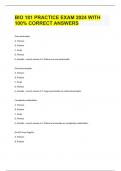
-
BIO 181 PRACTICE EXAM 2024 WITH 100% CORRECT ANSWERS
- Exam (elaborations) • 18 pages • 2024
-
- $16.49
- + learn more
BIO 181 PRACTICE EXAM 2024 WITH 100% CORRECT ANSWERS Only autotrophic. A. Monera B. Protista C. Fungi D. Plantae E. Animilia - correct answer Plantae are only autotrophic. Only heterotrophic. A. Monera B. Protista C. Fungi D. Plantae E. Animilia - correct answer Fungi and animilia are only heterotrophic. Completely multicellular. A. Monera B. Protista C. Fungi D. Plantae E. Animilia - correct answer Plantae and animilia are completely multicellular.
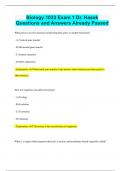
-
Biology 1033 Exam 1 Dr. Hasek Questions and Answers Already Passed
- Exam (elaborations) • 19 pages • 2024
- Available in package deal
-
- $9.99
- + learn more
Biology 1033 Exam 1 Dr. Hasek Questions and Answers Already Passed What process involves bacteria transferring their genes to another bacterium? - A) Vertical gene transfer - B) Horizontal gene transfer - C) Genetic mutation - D) DNA replication - Explanation: Horizontal gene transfer is the process where bacteria pass their genes to other bacteria. How are organisms classified in biology? - A) Ecology - B) Evolution - C) Taxonomy - D) Anatomy - Explanation: Taxonomy is the c...
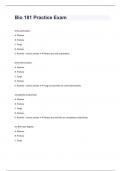
-
Bio 181 Practice Exam with correct answers
- Exam (elaborations) • 18 pages • 2024
- Available in package deal
-
- $17.99
- + learn more
Bio 181 Practice ExamOnly autotrophic. A. Monera B. Protista C. Fungi D. Plantae E. Animilia - correct answer Plantae are only autotrophic. Only heterotrophic. A. Monera B. Protista C. Fungi D. Plantae E. Animilia - correct answer Fungi and animilia are only heterotrophic. Completely multicellular. A. Monera B. Protista C. Fungi D. Plantae E. Animilia - correct answer Plantae and animilia are completely multicellular. Do NOT have flagella. A. Monera B. Protista C. Fung...
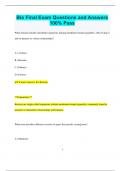
-
Bio Final Exam Questions and Answers 100% Pass
- Exam (elaborations) • 22 pages • 2024
-
- $9.99
- + learn more
Bio Final Exam Questions and Answers 100% Pass What domain includes unicellular organisms lacking membrane-bound organelles, often living in and on humans in various relationships? A.) Archaea B.) Bacteria C.) Eukarya D.) Protista Correct Answer: B.) Bacteria **Explanation:** Bacteria are single-celled organisms without membrane-bound organelles, commonly found in parasitic or mutualistic relationships with humans. What term describes different versions of genes that encod...
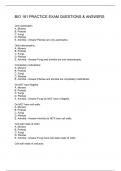
-
BIO 181 PRACTICE EXAM QUESTIONS & ANSWERS
- Exam (elaborations) • 12 pages • 2024
- Available in package deal
-
- $12.49
- + learn more
Only autotrophic. A. Monera B. Protista C. Fungi D. Plantae E. Animilia - Answer-Plantae are only autotrophic. Only heterotrophic. A. Monera B. Protista C. Fungi D. Plantae E. Animilia - Answer-Fungi and animilia are only heterotrophic. Completely multicellular. A. Monera B. Protista C. Fungi D. Plantae E. Animilia - Answer-Plantae and animilia are completely multicellular. Do NOT have flagella. A. Monera B. Protista C. Fungi D. Plantae E. Animilia - Answer-Fungi do ...
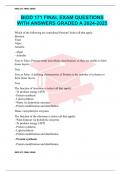
-
BIOD 171 FINAL EXAM QUESTIONS WITH ANSWERS GRADED A 2024-2025
- Exam (elaborations) • 21 pages • 2024
-
- $14.49
- + learn more
Which of the following are considered Protista? Select all that apply. Bacteria Yeast Algae Amoeba - Algae - Amoeba True or False: Protista retain unicellular classification, as they are unable to form tissue layers. True True or False: A defining characteristic of Protista is the inability of colonies to form tissue layers. True The function of lysosome is (select all that apply): - To produce energy (ATP) - Protein synthesis - Lipid synthesis - Waste via hydrolytic enzymes - Pr...

-
TEST BANK MICROBIOLOGY OPENSTAX 2024
- Exam (elaborations) • 827 pages • 2024
-
- $19.09
- 1x sold
- + learn more
OpenStax Microbiology Test Bank Chapter 1: An Invisible World Page 1 of 17 Chapter 1: An Invisible World * = Correct answer Multiple Choice 1. Which of the following is true of the microbial world? A. All microbes are harmful. B. Humans could survive without microbes. C. Many microbes are helpful.* D. Most microbes are pathogenic. Difficulty: Easy ASM Standard: 23, 24 2. Which of the following is when humans first suspected the existence of microbes? A. during the Industrial Revolu...

-
CLEP Biology Exam Review (Latest 2023/ 2024 Update) Questions and Verified Answers| Grade A | 100% Correct
- Exam (elaborations) • 39 pages • 2023
- Available in package deal
-
- $10.99
- + learn more
CLEP Biology Exam Review (Latest 2023/ 2024 Update) Questions and Verified Answers| Grade A | 100% Correct Q: Cellular Respiration Is the process that releases energy for use by the cell. Q: A hydrogen bond Answer: Is weaker than ionic, covalent, disulfide, or double bonds. Q: A hydrogen bond involves Answer: the attraction of atoms of different polarity and can be easily broken. Q: Ionic bonds involve Answer: the transfer of electrons. Q: Covale...
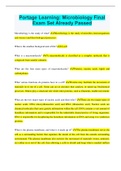
-
Portage Learning: Microbiology Final Exam Set Already Passed
- Exam (elaborations) • 40 pages • 2022
- Available in package deal
-
- $10.49
- 19x sold
- + learn more
Portage Learning: Microbiology Final Exam Set Already Passed Microbiology is the study of what? Microbiology is the study of microbes (microorganisms and viruses) and their biological processes. What is the smallest biological unit of life? A cell What is a macromolecule? A macromolecule is classified as a complex molecule that is composed from smaller subunits. What are the four main types of macromolecules? Proteins, nucleic acids, lipids and carbohydrates What various functions do protein...
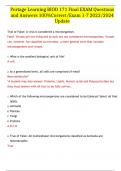
-
BIOD 171 Portage Learning Final EXAM Questions and Answers 100%Correct/Exam 1-7 2023/2024 Update
- Exam (elaborations) • 44 pages • 2023
-
- $20.99
- 5x sold
- + learn more
BIOD 171 Portage Learning Final EXAM Questions and Answers 100%Correct/Exam 1-7 2023/2024 UpdatePortage Learning BIOD 171 Final EXAM Questions and Answers 100%Correct/Exam 1-7 2023/2024 Update True or False: A virus is considered a microorganism. False. Viruses are not living and as such are not considered microorganisms. Viruses can, however, be classified as microbes, a more general term that includes microorganisms and viruses. 1. What is the smallest biological unit of life? A cell. ...

$6.50 for your textbook summary multiplied by 100 fellow students... Do the math: that's a lot of money! Don't be a thief of your own wallet and start uploading yours now. Discover all about earning on Stuvia


